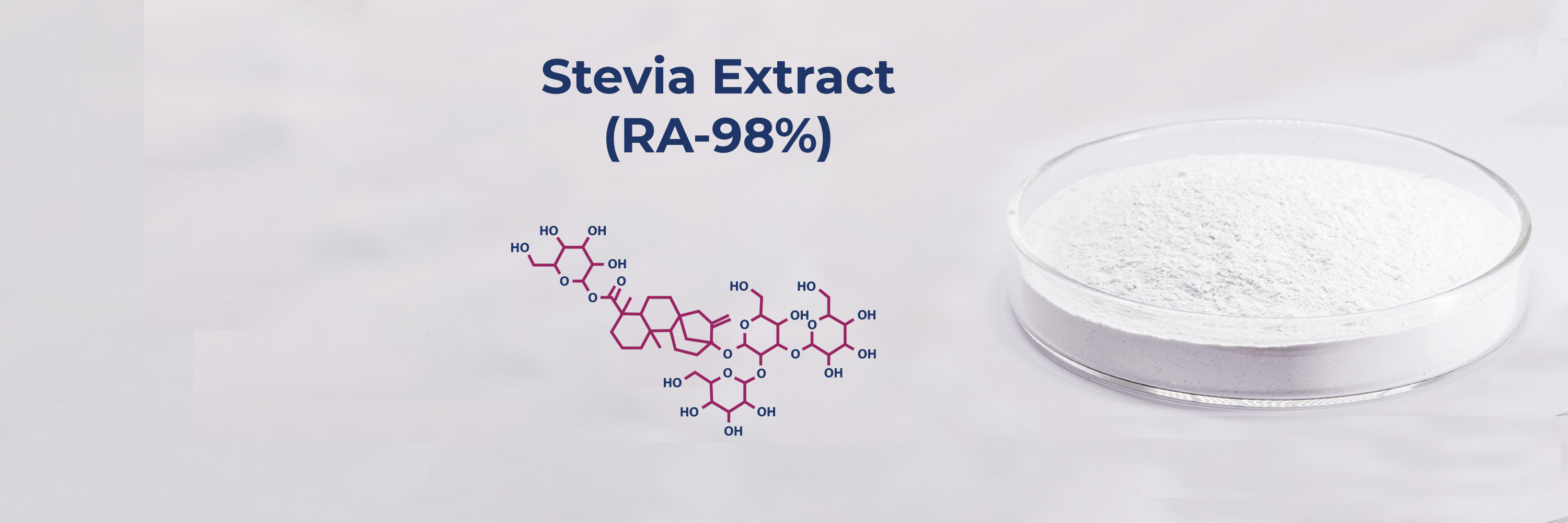INTRODUCTION
Stevia extract with Rebaudioside A (98%) is one of the sweet tasting steviol glycoside, extracted and purified from Stevia rebaudiana (Bertoni) – a small perennial shrub also known as “Honey leaf”. The leaves of S. rebaudiana contain more than 30 different steviol glycosides, among which stevioside and rebaudioside A are present in the highest levels. It is non-nutritive and tastes approximately 200-300 times sweeter than sucrose.
MANUFACTURE
Extraction process using water / alcohol (food grade) OR Bioconversion with the use of enzymes OR Glucosylation OR Fermentation.
| Synonym | Steviol Glycoside |
| Botanical Name | Stevia Rebaudioside |
| Part Used | Leaves |
APPLICATIONS
| Therapeutics : It is reported to be safe for consumption, do not produce toxic substances inside the body that are not associated with any health risks. Studies have demonstrated below positive effects on human health: |
|---|
| Antidiabetic |
| Antihypertensive |
| Anticancer and Antitumor |
| Antimicrobial Activity |
| Anti-caries |
| Antioxidant |
| Weight Management |
| Food Industry : Stevia extract (RA-98%) has emerged as zero-calorie sweeteners and can replace sugar in various industries as mentioned below : |
|---|
| Dairy products |
| Bakery products |
| Beverages |
| Juice and nectar drinks |
| Jellified goods |
SPECIFICATIONS
| Test | Unit | Specifications |
|---|---|---|
| Appearance | – | Fine Powder |
| Odor | – | Characteristic |
| Taste | – | Characteristic |
| Color | – | White |
| Loss on drying | % | ≤8.0 |
| Bulk Density (Tapped) | gm/ml | 0.2 – 1.0 |
| Assay (Rebaudioside A) | % | ≥ 98.0 |
| Heavy Metals | ppm | NMT 10 |
| Arsenic | ppm | NMT 2 |
| Cadmium | ppm | NMT 1 |
| Lead | ppm | NMT 2 |
| Mercury | ppm | NMT 1 |
| Microbial Test | ||
| Total Plate Count | cfu/gm | 10,000 |
| Yeast & Mold | cfu/gm | 1000 |
| E.coli | – | Should be Absent |
| Salmonella | – | Should be Absent |
| Staphylococcus aureus | Per 25 gm | Should be negative |
PACKING
25 kg HDPE Drum
STORAGE
Keep containers tightly closed in a dry, cool and well-ventilated place.
CERTIFICATIONS
WHO-GMP, ISO 22000, HACCP, Kosher, Halal & FAMI-QS
No matter the quantity you need, our exceptional quality and service will make ExSyn your supplier of choice! If you need any additional information or SDS, please contact us.
5-Methyl-3-vinyl-2-oxazolidinone (V-MOX) is a highly reactive monomer valued for its low viscosity, mild odor, and excellent reactivity. It is widely used as a reactive diluent in UV-curable inks and coatings, where it enhances adhesion, produces brighter colors, and improves safety compared to conventional diluents. In addition, V-MOX serves as a key building block in the synthesis of kinetic hydrate inhibitor (KHI) polymers, which are applied in oil and gas production to prevent hydrate blockages in pipelines.
Zinc ricinoleate is the zinc salt of ricinoleic acid, a hydroxylated fatty acid derived mainly from castor oil (Ricinus communis). It appears as a white to slightly yellowish powder, waxy solid, or paste, depending on formulation. Its most valuable property is its ability to trap and absorb odor molecules such as amines, sulfides, and short-chain fatty acids, making it an essential ingredient in deodorant and odor-control products.
2-(tert-Butyl amino)ethyl methacrylate (TBAEMA) is a functional methacrylate monomer that contains a secondary amine group and a hydrophobic tert-butyl moiety, giving it excellent versatility in pH-responsive and adhesion-enhancing polymer systems.
It is valued in printing ink formulations for its ability to enhance adhesion, flexibility, and surface interaction.
Commonly known as potassium bis(fluorosulfonyl)imide (KFSI), the compound has a three-carbon backbone bearing six fluorine atoms and two sulfonimide (-SO₂F) groups. The molecule’s architecture lends it both high chemical stability and useful reactivity. Because of its excellent ionic conductivity and thermal / electrochemical stability, it finds use in advanced electrolyte formulations—for example in lithium-ion and next-generation batteries, in ionic liquids, and in other electrochemical systems.
Colchicine is a naturally occurring alkaloid obtained primarily from the autumn crocus (Colchicum autumnale) and related species. It has been used in medicine for centuries, especially for the treatment of gout and Familial Mediterranean Fever. In modern medicine, Colchicine is valued also in conditions like pericarditis, Behçet’s disease, and certain dermatological and cardiac disorders.
1-Butylimidazole is a versatile organic heterocyclic compound belonging to the imidazole family, where a butyl group (–CH₂–CH₂–CH₂–CH₃) is attached to the nitrogen atom at the 1-position of the imidazole ring. Its applications span organic synthesis, materials science, and bioactive compound development due to its tunable physicochemical properties and structural versatility.
Atropine sulfate monohydrate is a chemical compound, specifically a salt of atropine and sulfuric acid, with one water molecule (monohydrate) attached. It is commonly used as a medication and in research due to its anticholinergic properties, meaning it blocks the effects of acetylcholine at muscarinic receptors.
4-Aminobenzoic acid, commonly abbreviated as PABA, is an aromatic amine and carboxylic acid compound. It consists of a benzene ring substituted with an amino group (–NH₂) in the para position to a carboxylic acid group (–COOH).
2-Amino-5-Nitrophenol (5-NAP) is an organic compound with the molecular formula C₆H₆N₂O₃. It is a substituted phenol with both an amino group (-NH₂) and a nitro group (-NO₂) attached to a benzene ring, along with a hydroxyl group (-OH).
